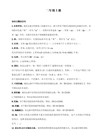小升初英语时态复习讲义
六年级下册英语-小升初总复习-时态全解-人教版PEP(共29张PPT)

将来时理论
一、 概念:表示将要发生的动作或存在的状态及打算、 计划或准备做某事。 句中一般有以下时间状语: tomorrow, next day(week, month, year…),
soon, the day after tomorrow(后天) this morning , this afternoon , this evening等。
试题演练:
三、 选择正确的答案。 B presents for my parents yesterday. 1. I ____ A. buyed B. bought C. buying C 2. Susan _____ swimming yesterday. A. go B. goes C. went B 3. Danny _____ breakfast five times last week. A. eat B. ate C. eated C Tree Planting Day. 4. Last Sunday____ A. is B. were C. was
试题演练:
一、写出下列动词的过去式或动词原形。 went was 1. go_______ 2. is___________ Lorem ipsum dolor bought 3.buy_______ 5. have had ____
sit amet, consectetur adipisicing elit, sed do eiusmod tempor incididunt ut labore
swam 4.swim__________
6. watched watch _____
eat 7. ate______
get 8. got__________
小升初必会四大时态(课件)-2023-2024学年人教PEP版英语六年级下册

A. Do; go
B. Did; went C. Did; go
3. My brother _______ a skirt for me yesterday.
A. bought
B. buys
C. buy
版权声明
感 谢 您 下 载 平 台 上 提 供 的PPT 作 品 , 为了 您 和熊 猫 办公 以 及原 创 作者 的 利益 , 请勿 复 制、 传 播、 销 售, 否 则将 承 担法 律 责任 ! 熊猫 办 公将 对作品进行维权,按照传播下载次数进行十倍的索取赔偿!
一般过去时—— Exercises
三、单项选择。
1. Bill likes reading. He_____ books with his dad every evening.
A. read B. reads C. is reading D. has read
2. He often _______ football in the school.
1 . 在 熊 猫 办 公 出 售 的 PPT 模 板是 免 版税 类 (R F : Ro yal ty-F re e )正 版 受《 中 国人 民 共 和国 著 作法 》 和《 世 界版 权 公约 》 的保 护 ,作 品 的 所 有 权 、 版 权 和 著 作权 归 熊猫 办 公所 有 ,您 下 载的 是 PPT 模 板素 材 的使 用 权。 2 . 不 得 将 熊 猫 办 公 的 PPT 模 板、 PPT 素 材 ,本 身 用于 再 出售 , 或者 出 租、 出 借、 转 让、 分 销、 发 布或 者 作为 礼 物供 他 人使 用 ,不 得 转授 权、出卖、转让本协议或者本协议中的权利。
一般过去时—— Exercises
小升初(全国通用)英语时态复习 现在进行时态讲与练

现在进行时的否定句和疑问句
否定句(be后加not): be+ not+ v-ing
He is not playing football now. 一般疑问句(be提到句首): be + 主语 + v-ing…?
特殊疑问句(疑问词+一般疑问句) 疑问词+be +主语+ v-ing…?
A. Is; playing
B. Are; playing C. Do; play
二、单项选择(二)
二、单项选择(三)
1. —What are you doing? —I __D___.
A. eat
B. can eat
C. eating
D. am eating
2. We want ____D_____ this book now.
A. wearing
B. am wearing
( B )2. Tom ____ TV in the room now.
A. are watching B. is watching
( C )3. Look!Jane ____ housework.
A. is do
B. doing
( C )4. Listen! Some of the girls ____.
B. Are; showing
C. Do; showing
回目录页
举一反三
3. 按要求改写下列句子。 (1) Kenny often plays the guitar on the weekend. (用
now 改写句子) __K_e_n_n_y_i_s_p_l_a_y_in_g__th_e__g_u_it_a_r_n_o_w__. ____________ (2) We are watching cartoons on TV now. (改为否定句) ___W__e_a_r_e_n_’t__w_a_t_c_h_in_g__ca_r_t_o_o_n_s_o_n__T_V_n__o_w_._______ (3) My grandpa is writing a letter. (就画线部分提问) ___W__h_a_t_i_s_y_o_u_r_g_r_a_n_d_p_a__d_o_in_g_?_________________ (4) 我正在和父母亲谈论我的生日。(汉译英) __I_’m__t_a_lk_i_n_g_a_b_o__u_t_m_y__b_ir_t_h_d_a_y_w__it_h_m__y_p_a_r_e_n_t_s_. __
小升初小学英语语法总复习资料大全现在进行时一般现在时PPT讲稿思维导图知识点归纳总结[PPT白板课件]
![小升初小学英语语法总复习资料大全现在进行时一般现在时PPT讲稿思维导图知识点归纳总结[PPT白板课件]](https://img.taocdn.com/s3/m/a7606245b7360b4c2e3f64f5.png)
watch TV John_w_a_tc_h_e_s _T_V_ every day.
Amy and her teacher, study
__T_h_e_y_s_tu_d_y_t_o_g_e_t_he_r___ every Friday.
have dancing lessons Sally _h_a_s_d_a_nc_i_n_g_le_s_s_o_ns__every Fridays.
fly a kite My brother _f_l_ie_s_a_k_i_te____every Sundays.
Katie, do thee_s_t_h_e__sh_o_p_p_in_g__ every Saturday.
play table tennis Jerry _p_la_y_s_t_a_bl_e_t_e_n_n_is_every Wednesdays.
play read walk feed
plays reads walks feeds
If the verb ends in -sh, -ch or -o, we
have to put es” instead of s.
wash
washes
finish
finishes
catch
catches
go
goes
have to put es” instead of s.
wash
washes
finish
finishes
catch
catches
go
goes
do
does
If the verb ends in -y, we have to
change the letter y into ies.
人教PEP版英语六年级下册小升初语法复习-动词时态(课件)

8. They _a_r_e__g_o_i_n_g__to__h_a(vheave ) a meeting next week, aren't they? 9. Both he and I __a__r_e___ (be) teachers. 10. I _d_i_d_n_’_t__fe_e_l_ (not feel ) very well yesterday . 11. He put on his coat and ___w__e_n_t__ (go) out. 12. Lei Feng often ___h_e_l_p_e_d____ (help) others and he was helpful. 13.Next Sunday, we __w__il_l_c_l_e_a_n_________ (clean) up the park. 14. Hurry! Your mother _i_s_w__a_i_t_in__g__ (wait) for you at the school gate.
reading getting
用所给词的正确形式填空
1.Peter __p_l_a_y_s__ (play) basketball twice a week. 2. Do you believe what he _s_a_i_d____ (say) just now? 3. Look! The lazy cat _i_s_s_l_e_e_p_i_n_g__ (sleep) in the sofa. 4. There ___is____(be) a book and two pens on the desk. 5. _A__r_e_you __g_o__in__g_t_o__s_e_e__(see ) a film tomorrow morning? 6. She _is_n__’t__p_l_a_y_i_n_g(not play) the guitar at the moment. 7. What _d_o__e_s_his father usually __d_o____(do) in the evening ?
小升初英语专题考点讲解课件---时态 现在进行时 PPT课件

小升初英语专题考点讲解课件---时态 现在进行时 PPT课件 小升初英语专题考点讲解课件---时态 现在进行时 PPT课件
小升初英语专题考点讲解课件---时态 现在进行时 PPT课件
1.正确、流利、有感情地朗读课文, 感悟并 积累有 启发性 的句子 。
6.朗读指导:定准高兴的基调,语速 要根据 内容的 变化时 缓时急 7.学习曹冲平时多观察,遇事多动脑 筋的优 秀品质 。
小升初英语专题考点讲解课件---时态 现在进行时 PPT课件
小升初英语专题考点讲解课件---时态 现在进行时 PPT课件 小升初英语专题考点讲解课件---时态 现在进行时 PPT课件
What are they doing? T--时态 现在进行时 PPT课件
The Present Continuous Tense(现在进行时态) 定义:现在进行时态表示现在正在进行或发生的某种事情或动作。 构成:主语+be(am,is,are)+动词-ing 标志:当句中出现Look/Listen/now或上下文提示时,用现在进行时。
3. 重读闭音节单词,如果末尾只有一个辅音字母,则双写辅音字 母,再加-ing。如: get-getting,shop-shopping,run-running,swim-swimming
小升初英语专题考点讲解课件---时态 现在进行时 PPT课件
小升初英语专题考点讲解课件---时态 现在进行时 PPT课件 小升初英语专题考点讲解课件---时态 现在进行时 PPT课件
Exercise:
请写出下列动词的现在分词。
help
come
swim
eat
give
小升初时态的分类和应用(讲义)译林版英语六年级下册
时态的分类和应用一、一般现在时:1. 一般现在时构成形式:sb. do/ does; sb. is/ am/ are2. 一般现在时用法:1). 表示经常的或习惯性的动作,常与表示频度的副词连用。
常用的频度副词有:always、often、usually、sometimes频度副词在句中通常放在行为动词之前,系动词、助动词之后。
如:He often goes to the cinema2). 表示现在的状态。
例:Mother is ill.3) 表示主语具备的性格、特征和能力等。
例:He sings well.4). 表示客观真理,客观存在,自然现象。
例:The earth turns around the sun.5). 表示按计划或安排好的,或将要发生的动作,可用一般现在时表将来。
但只限于start,begin, leave, go, come, arrive, return, take place等。
例:My train leaves at 7:00 this morning.6). 在复合句中,当主句是一般将来时,时间或条件状语从句的谓语动词只能用一般现在时来表示将来要发生的动作。
If it rains tomorrow, we won’t go there.3. 第三人称单数变化规律:1). 一般情况下,动词直接在结尾加-s. Eg.: help - helps, play - plays2). 以s, x, ch, sh, o结尾的动词,在后面加-es. Eg.: brush - brushes, go - goes, teach - teaches3). 以辅音字母+y结尾的动词,把y变为i加es. Eg.: study - studies, try - tries4. 相关句型1). 一般疑问句:Is/ Are +主语…? Do/ Does +主语+动词原形…?2). 否定句:主语+am /is/ are +not… 主语+do/ does not +动词原形…二、一般过去时1. 一般过去时构成形式:sb. did; sb. was/ were2. 一般过去时用法:1). 过去某个时间里发生的动作或状态。
小升初英语四种时态 ppt课件
29
30
31
32
33
34
35
36
will+动词原形
37
38
按要求完成下列句子
• Students will go to school in the future. • 1、改为否定句: • Students will not go to school in the future. • _________________________________ • 2、改为一般疑问句: • Will students go to school in the future. • ————————————————————— • 3、针对Students改为特殊疑问句: • Who • —————————————————————
第十七次课
1
2
精品资料
• 你怎么称呼老师? • 如果老师最后没有总结一节课的重点的难点,你
是否会认为老师的教学方法需要改进? • 你所经历的课堂,是讲座式还是讨论式? • 教师的教鞭 • “不怕太阳晒,也不怕那风雨狂,只怕先生骂我
笨,没有学问无颜见爹娘 ……” • “太阳当空照,花儿对我笑,小鸟说早早早……”
15
16
17
18
19
20
例题
• Look! Tom is _______TV. Mary and Kate_______.
• A. watching; sleep
B. watching; sleeping
• C. watching; are sleeping
21
22
23
24
25
26
42
选择:
43
tomorrow. • 3、 ______your mother _______(洗衣服)now? • 4、He________ (去公园)to the park last week. • 5、Listen! They aren’t_________(唱歌) • 6、Lily_____________(打扫房间)every day.
小升初英语语法时态讲解与归纳
小升初英语语法时态讲解与归纳则加es: XXX3)以辅音字母+y结尾的动词,变y为i再加es: studies flies carries tries4)不规则变化:has does is goes sees一般过去时一.意义:表示过去某个时间发生的动作或状态,常和表示过去的时间状语连用。
二.构成及变化1.行为动词的变化肯定句:主语+动词过去式(+其它)。
如:I watched TV last night.否定句:主语+ didn't+动词原形(+其它)。
如:I didn't watch TV last night.一般疑问句:Did +主语+动词原形+其它?如:Did you watch TV last night?Yes。
I did。
/ No。
I didn't.特殊疑问句:疑问词+一般疑问句?如:When did you watch TV last night?2.be动词的变化肯定句:主语+was/were(+其它)。
如:I was happy XXX.否定句:主语+XXX(+其它)。
如:I wasn't happy XXX.一般疑问句:XXX主语(+其它)?如:Were you happy XXX?Yes。
I was。
/ No。
I wasn't.特殊疑问句:疑问词+一般疑问句?如:Where were you yesterday?三.过去式的不规则变化1)动词原形和过去式相同:put cut let set hurt cost hit2)变化规则不规则:do-did go-went see-saw eat-ate get-got come-came3)完全不规则:be-was/were have-had现在进行时一.意义:表示现在正在进行的动作或状态。
二.构成及变化1.构成:be(am。
is。
are)+现在分词(-ing)2.变化:肯定句:主语+be(am。
小升初(全国通用)英语时态复习 四大时态的综合导图(课件)
does goes has works reads swims plays
现在分词
doing going having working reading swimming playing
过去式
did went had worked read swam played
1.主语+ be动词
结
(was, were)
以重读闭音节结尾,
双
且末尾只有一个辅音 字母,双写+ed
stop-stopped
改
以辅音字母+y结尾, 改y为i再加ed
try-tried
特
read-read eat-ate
go-went 等
一般直接+s want-wants
以辅音字母+y结尾, 改y为i再加es
fly-flies 1. 以o,x,sh,ch,s 结尾+es, go-goes 2.have-has
A( ) 4. I’m picking apples with my grandparents _________.
A. now正在摘苹果 B. just now
C. tomorrow
此时此刻
忙碌的 上周
C ( )5. _____ Mr Brown busy last week?
be+形容词
A. Did
singing.
• We won’t go
shopping tomorrow.
疑 • Was he a driver
问
before?
句 • Did they go
shopping
yesterday?
• Are you a student ? • Do you like reading? • Does he like
- 1、下载文档前请自行甄别文档内容的完整性,平台不提供额外的编辑、内容补充、找答案等附加服务。
- 2、"仅部分预览"的文档,不可在线预览部分如存在完整性等问题,可反馈申请退款(可完整预览的文档不适用该条件!)。
- 3、如文档侵犯您的权益,请联系客服反馈,我们会尽快为您处理(人工客服工作时间:9:00-18:30)。
英语时态专题复习 一、一般现在时: 1、现在的状态 2、经常或习惯性动作 3、客观真理
1、标志:often(经常),usually(通常),sometimes(有时),always(总是),never(从不), on Sundays(在星期天), every day/month/year(每一天/月/年) 例:He usually wakes up at 7 o’clock. The sun rises in the east.
二. 现在进行时:表示说话瞬间或现阶段正在进行的动作。 1、 标志: now(现在)listen(看)look(听) 2、 结构:主语+助动词be(am/is/are)+行为动词的现在分词(doing) 现在分词的构成:1.-ing: eat-eating 2.辅音字母+e: take-taking 3. sit, put, begin, run, swim, stop, get, shop,(双写最后一个辅音字母,再加ing.)二.现在进行时:is / am / are + 现在分词
补充:2.表现阶段正进行的动作。 ►. He is taking physics this semester(本学期)。 ►. We are preparing for our final examination this week.
3.go, come, leave, arrive, land, meet, die, start, return, join, etc. 用于进行时态时表示即将开始的动作。 ►. Look! The bus is coming.看!车来了! ►. The old man is seriously ill, and he is dying. ►. Alice is leaving for Beijing with her mother. 4.与 always, forever, continually等副词连用,表示说话人带有感情色彩:赞赏或厌恶。 ►. He is always making mistakes.(他总是犯错。) ►. The boy is continually making noises.(这男孩不断地发出吵闹声。)
练习:1. Jim __________________(take) photos in the park now. 2. Jim_________(not take) in the park now. 3. _______________Jim____________(take) photos in the park now? Yes, he _____. No, he _______. 4. Where _________Jim ____________ photos now? In the park. 三. 一般过去时:动词变化:动词变成过去式,动词加“ed”;Play -> played 1.辅音字母和“y”结尾的词,如carry -> carried 2.重读闭音节的单词,双写最后一个字母,再加ed stop -> stopped
一般过去时表示过去某个特定时间或某一段时间发生的动作或情况,句中常有yesterday, ago, in 1989, once, last week (month, year), at that time, just now 等时间状语。 1、he was born in 1989. 2、I used to play football when I was young. 测试精编 I:(用所给动词的正确进态填空)。 1. Alice usually ________ (sit) in the front of the classroom, but she ________ (sit) at the back this morning. 2. He ________ (tell) the news to us three days ago. 3. He________ (begin) to teach Chinese in 1990.
四.1. 现在完成时 现在完成时由“have / has + 过去分词”构成 现在完成时既可表示过去发生的动作对现在所造成的结果或影响(此时通常连用的时间状语有already, yet, just, ever, before),也可表示动作从过去某时间开始,一直持续到现在,并且还有可能持续下去(此时通常连用的时间状语有 these days, recently / lately, in the past few + 时间段, since +时间点, for + 时间段)。如:
I have just finished my work. 我把工作做完。 Have you ever been to Beijing? 你曾经去过北京吗? I have lived here for ten years. 我在这儿住了十年了。 We have studied here since 2003. 我们自2003年来就在这儿读书了。 1.I_______ a letter from him since he left.(天津市) A.didn't receive B.haven't got C.didn't have D.haven't heard 2.—Where have you _______ these days? —I have to Dazhu with my friends.(重庆市)
A.been;gone B.been;been C.gone;been D.gone;gone 3.His brother has been to Stone Forest twice _______ he came to Yunnan.(昆明市) A.after B.before C.since D.for 4.—Where's Peter? —He _______ to Nanjing.(沈阳市) A.is going B.has been C.has gone D.went 5.You've never seen such a wonderful film before,_______ ?(河北省) A.haven't you B.have you C.do you D.don't you 6.We have lived here _______ five years ago.(河南省) A.when B.since C.before D.after 7.—I have watched the game. —When you _______ it?(长沙市) A.have;watched B.do;watch C.did;watch D.will;watch
五. 一般将来时:shall / will + 动词原形 表示将要发生的动作或存在的状态。 1、We will visit the science museum next week. 2、We are going to discuss the problem tomorrow. 一般将来时除了shall/will +v以外还有be going to +v,表示不久即将发生的事,be doing(用于某些动词,如leave, come, start, reach等);be +to +v,可带时间
状语,表示“必须”; “打算”,be about +to +v,表示“即将”。例如: I. be going to do something. 打算做某事。 ● I'm going to buy a new coat this fall. II. be about to do sth. 即将做某事。 ● The talk is about to begin.
Ⅲ. be doing. 即将,将要
● Hurry up! The bus is starting. ● We are leaving for Nanjing tomorrow. ( ) 1. There __________ a meeting tomorrow afternoon.
A. will be going to B. will going to be C. is going to be D. will go to be ( ) 2. Charlie ________ here next month. A. isn’t working B. doesn’t working C. isn’t going to working D. won’t work ( ) 3. He ________ very busy this week, he ________ free next week. A. will be; is B. is; is C. will be; will be D. is; will be ( ) 4. There ________ a dolphin show in the zoo tomorrow evening. A. was B. is going to have C. will have D. is going to be ( ) 5. –________ you ________ free tomorrow? – No. I ________ free the day after tomorrow. A. Are; going to; will B. Are; going to be; will C. Are; going to; will be D. Are; going to be; will be ( ) 6. Mother ________ me a nice present on my next birthday. A. will gives B. will give C. gives D. give
